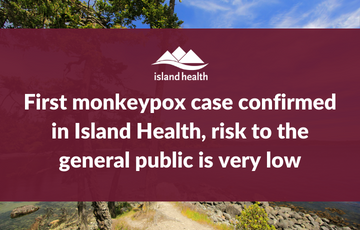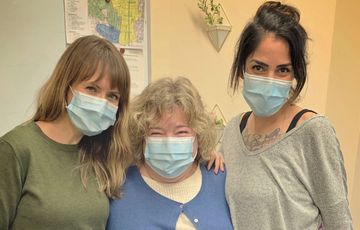For information about COVID-19 (Coronavirus) please visit our COVID-19 webpage.
I've heard about 'superbugs' in the hospitals. What are they?
Antibiotic Resistant Organisms (AROs) have been called ‘superbugs’ in the media because they are more resistant to antibiotics than other strains. AROs have been present around the world for decades, and it is not surprising they are brought into the hospital from surrounding communities.
Island Health uses infection control measures to prevent the introduction and spread of these organisms, including:
- Screening patients/residents when they are admitted to hospital and long term care facilities
- Education for staff, patients and visitors
- Hand hygiene stations
- Infection Control precautions where necessary
For more about steps Island Health takes to reduce transmission of organisms including AROs in its facilities, please visit Infection Prevention and Control.
Not all long-term care (LTC) facilities are operated by Island Health, but each facility is responsible for practicing infection control and notifying residents/visitors of outbreaks that directly impact them. Visitors and residents are encouraged to contact their local facility manager should they have questions about a particular facility.
The easiest way to stop the spread of infection is to wash your hands regularly using soap and water. When soap and water is not available, the use of alcohol-based hand rub products can also be used.
When coming to hospital, you can take these extra steps:
- Enhanced cleaning practices.
- Wash your hands or use the alcohol-based hand rub product when you come in, and when you leave. There are hand hygiene stations conveniently located throughout all Island Health hospitals and long term care facilities.
- Follow instructions given by staff during admission, and when visiting patients.
- Look for signs posted that identify if other steps need to be taken, such as wearing a gown.
- Only visit the patient you have come to visit.
- It is also very important that if you are thinking of visiting someone in hospital or in long-term care, but have a bad cough, fever, or are vomiting or have diarrhea, that you stay home. If there is an urgent reason that you must visit when ill, please notify the staff so that they can provide you with a mask or whatever else is required to decrease the transmission of your illness to others.
- Do not use patient/resident bathrooms.
An outbreak is recognized if three or more cases of patients and/or staff occur within a designated time frame and in a confined area or unit.
When a case of H1N1 is confirmed, it is not listed on these pages unless there is a recognized outbreak.
For C. difficile, an outbreak is recognized when the number of directly related cases increases above what is normally experienced in a designated period of time (i.e. 30-day reporting period).
Outbreaks are declared over when specific criteria have been met (i.e. 96 hours without new cases – Norovirus; no new transmission within 2 week period – VRE;).
Often, if a disease such as Norovirus (vomiting, diarrhea) or influenza (cough, fever, aches) is increasing in the community, it can be expected that it will also occur in hospitals and long-term care facilities. Theses outbreaks are generally seasonal, and are seen predominately from October to March.
There has been a steady increase in the number of cases of AROs worldwide. It is more likely that you will see an increase in the number of colonized people (those who have the organism), than those with infections as a result of the organism.
Signs are posted in key locations, such as on the front to a facility or at the entrance to a unit or on the patient room door.
The facility operator (Island Health or otherwise) notifies individuals of an precaution they need to take if they are visit or providing care to someone who is ill.
You can also look up active outbreaks anytime by visiting the Active Outbreak List.



